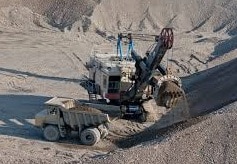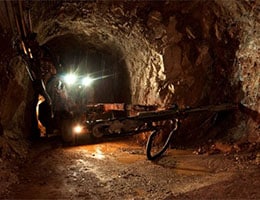 The exploitation of mines is called mining : the deposits that allow the extraction and treatment of minerals . The concept can refer to the mining operations in a region, to all industries of this type or to the workers who work in this field.
The exploitation of mines is called mining : the deposits that allow the extraction and treatment of minerals . The concept can refer to the mining operations in a region, to all industries of this type or to the workers who work in this field.
Mining is an activity that is part of the primary sector of the economy . Its essential task is to extract minerals found in the subsoil or on the surface.
Depending on the type of mineral, it is possible to differentiate between metallic mining (which works with materials such as gold , lead , copper and silver) and non-metallic mining (focused on granite, clay, marble, etc.). ). Also, according to the type of exploitation, a distinction is made between underground mining and open pit mining .
Once obtained, minerals are used in multiple areas: they can serve as construction material, as raw material for the manufacture of industrial products or as central elements of jewelry, for example.
It is important to keep in mind that, beyond the technological advances that favor exploitation, mining is very old. Prehistoric man, in fact, already used minerals to make weapons and tools.
Another relevant aspect regarding mining is its impact on the environment . Water and soil pollution , deforestation and erosion are some of the common effects of these practices: that is why governments must establish laws and controls that guarantee the care of the planet.
It is public knowledge that mining is one of the most dangerous activities in the world. According to statistical studies by the International Federation of Chemical, Energy, Mine and Industrial Workers , more than 12 thousand miners die every year, 6 thousand of them in China.
Mining risks are classified according to the type of impact and this gives us the following types: chemical, physical, biological, psychosocial and ergonomic . The most serious of the physical risks are traumatic injuries , which range from minor accidents to fatal ones.
Noise is another relevant factor in this framework: deafness and mining go hand in hand due to the noise pollution caused by machines throughout the entire work day. Miners must also protect themselves from heat and humidity , which often cause fatal heat stroke.
 Among the chemical risks, one of the most worrying is that of contracting the disease known as silicosis due to crystalline silica , a dust that can also cause expectoration, cough and dyspnea, later triggering pulmonary fibrosis and enhancing disorders such as kidney disease and rheumatoid arthritis.
Among the chemical risks, one of the most worrying is that of contracting the disease known as silicosis due to crystalline silica , a dust that can also cause expectoration, cough and dyspnea, later triggering pulmonary fibrosis and enhancing disorders such as kidney disease and rheumatoid arthritis.
Pulmonary fibrosis can also be contracted by exposure to coal dust , widely present in mining, and the main cause of black lungs . Asbestos , on the other hand, is linked to many cases of pleural mesotheioma and lung cancer .
The concomitant agent called tubercle bacillus occurs in a high number of miners with silicosis, especially in Africa, where the risk of tuberculosis is very high due to the prevalence of HIV. This leads to biological risks, which also include the legionella agent, which appears in cooling towers.
Although mining is becoming more mechanized every day, there are still many processes that must be carried out manually and can lead to trauma due to repetition and muscle overload. These are ergonomic risks, which especially affect the shoulder area. Regarding psychosocial risks, these are the consequences that this work can cause on an emotional level, which often lead to the abuse of substances such as alcohol and drugs.
